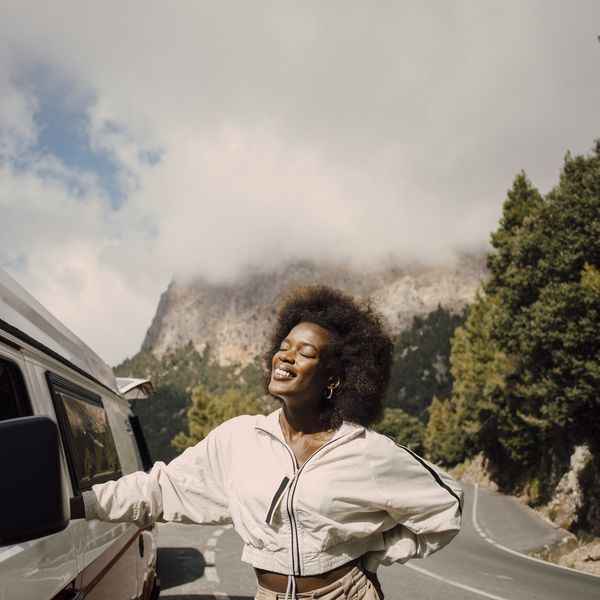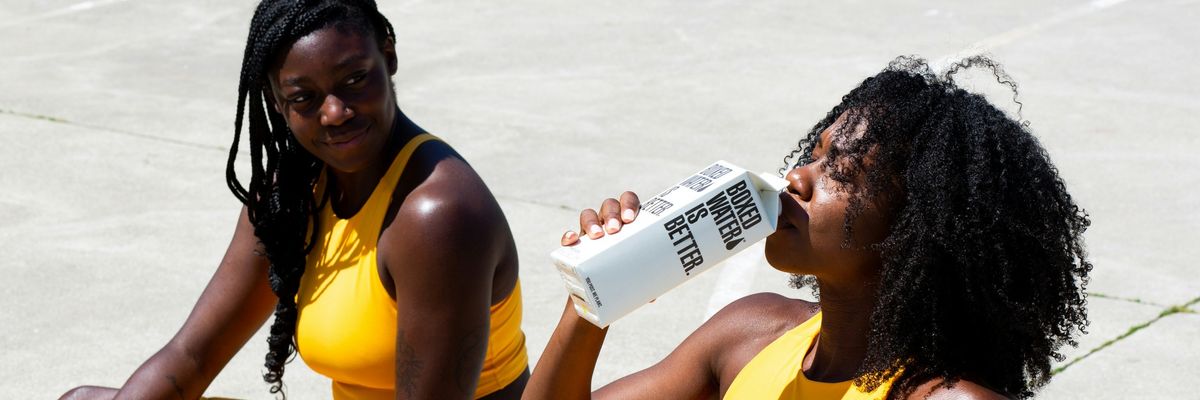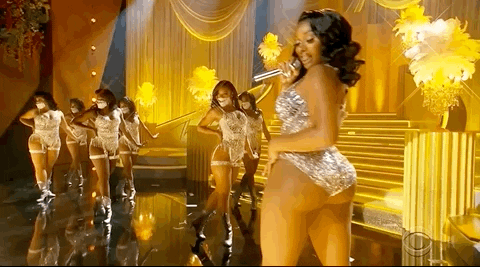
Black women emcees have been an essential part of sculpting hip-hop music since the late '70s. The genre has grown from the streets of New York City to become one of the most influential musical genres in the world. Though hip-hop is still a very male-dominated industry, women have made their way of snatching the sound and owning their place in the industry.
When female rappers entered the scene, they showed up with bars as prolific or better than their male counterparts — dressed from head to toe in a sexy tomboy flair that was beyond captivating on stage. Black women emcees have created their own lane, starting from battle rapping about systemic challenges in the Bronx, N.Y., to going all the way "Up" with Cardi B celebrating sexual liberation.
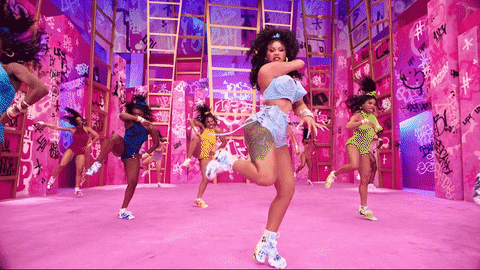
However, some of the biggest challenges in hip-hop music lie in the lack of radical feminism in the genre that shows a vast display of Black women artists of every shade, size, and sexuality—without being hypersexualized. They all need to be seen and celebrated as a mass-market artist.
Over the last few generations, the evolution of hip-hop's purpose and sound has changed dramatically—mainly for mass production and consumption. That's expected because change is inevitable in every form of music, but hip-hop is unique. It was used to amplify the voice of the unheard and highlight systemic oppression related to race and class issues. However, its hypermasculine aspect has always made combating sexism one of the most complex areas to address and has posed a challenge to forging progressive, long-term opportunities for Black women rappers.
Hip-hop scholar Kylie Thompson states in the analysis, When Feminism Meets Hip-Hop, "Some female hip-hop emcees have been able to challenge the sexist culture of the industry and assert a black feminist voice; albeit the large-scale commercialization of hip-hop makes it especially difficult for women's voices to be heard in a political context that runs counter to pervasive patriarchal structures. Thus, women must carefully adapt, form, and manipulate language in order to make their music both marketable and political."
These circumstances have made it significantly more difficult for women rappers to compete in a market that could care less about women succeeding in it because a high percentage of the content is about objectifying them.
 Cardi B Megan Thee Stallion GIF by Recording Academy / GRAMMYsGiphy
Cardi B Megan Thee Stallion GIF by Recording Academy / GRAMMYsGiphyBlack women emcees carry a different burden on their shoulders: to be Black, female, get the same opportunities as their male counterparts, and remain in high demand on the global charts. Black artists shouldn't just be the backbone to the sound. They should also be the face of the evolved sound.
This is a tribute to icons and holds them accountable so we can all show up better for all Black female hip-hop artists in the game, respectfully!
Let's take a deep dive into the evolution of hip-hop, amplifying the various forms of feminism throughout the genre's history, addressing hypersexuality, colorism, pretty privilege, and body positivity:
Black Feminism in Hip-Hop: Radical vs. Liberal
Before we can talk about the state of Black women artists in hip-hop, we must first broach the subject of feminism and the essence it carries in the music. Though every Black women artist isn't as intentional about being a feminist, most of the world automatically perceives them to be because of the lineage that several Black women iconic emcees started prior. There are two primary forms of feminism that are often conveyed in hip-hop; radical and liberal feminism, they are both needed, but the bigger question is whether they are both as appreciated by today's society.
Radical Black feminism came first because it was the only acceptable way to compete in the market with their male counterparts in the 70s. Hip-hop feminism centers Black women's voices via hip-hop as a means to increase agency, self-definition, and self-determination. Self-definition, according to scholar Patrick D. Bennett, refers to how Black women express their identities and experiences for themselves, while self-determination allows for Black women to choose who or what they want to be. In the documentary My Mic Sounds Nice: The Truth About Women and Hip-Hop, legendary hip-hop artist Roxanne Shantel said, "It wasn't about make-up or having outfits ready, I rapped in whatever I had on when I had a show or battle rap because it was about talent not looks."
In this timeframe of hip-hop, if you weren't a lyricist as a women emcee, you couldn't compete. And Black women rap artists like MC Lyte, Salt-N-Pepa, J.J.Fad, Queen Latifah, and the one-and-only Ms. Lauryn Hill, didn't hesitate to challenge sexism, addressing men and how they talk to or talk about women.
 Queen Latifah GIF by VH1 Hip Hop HonorsGiphy
Queen Latifah GIF by VH1 Hip Hop HonorsGiphyHip-hop thought leader Imani Perry has written about this struggle within the male-dominated field, stating, "As a masculinist form with masculinist aesthetics, hip-hop and the art form's masculinist ideals of excellence and competitiveness have often forced women to occupy roles gendered male."
And the freedom men have to be anything they want to be, and most of society enables them without question, isn't the same expectation that applies to women—who are more likely to get harshly criticized by society collectively.
As hip-hop evolved in the 90s, the sound changed dramatically from women hip-hop artists, and liberal feminism became more mainstream and left radical feminism a bit in the shadows of hip-hop instead of it being its main focus. Kylie further states that "liberal feminism boils down to individualism, positing the individual as the 'be-all, end-all of social life. This line of reasoning essentially aims to change or undo the socialization of individuals so that women can have and do what men can have and do." Liberal feminism brought forth undeniable individuality but took away from perpetuating social change and ignored the more significant issue of patriarchy.
In comparison, radical feminism addresses the collective issues the patriarchal system often looks away from. There is space for both radical and liberal feminism. But when it becomes too much of one versus the other, it often becomes detrimental to Black women rappers' progression in the industry.
Hypersexuality orchestrated by female hip-hop artists has become one of today's modern-day forms of feminism — to some, it may be an illusion, and to others, it may be perceived as power. The rise of liberal feminism exploring sexual liberation stemmed from the '90s with female artists Lil' Kim and Foxy Brown, both having an aligned rise in the industry that led to a divine royal battle. They brought unapologetic power to Black women's stance in hip-hop; both of them were phenomenal rappers that everyone wanted to listen to.
If you weren't listening to Notorious K.I.M., you were listening to Chyna Doll. But their sexualized stance also subconsciously brought a lot of pressure to other Black women artists in the industry.
In the documentary, My Mic Sounds Nice: The Truth about Women and Hip-Hop, Missy Elliott talked about feeling that "maybe I gotta go a little tighter to be sexy to be more acceptable," after Kim and Foxy took over the scene.
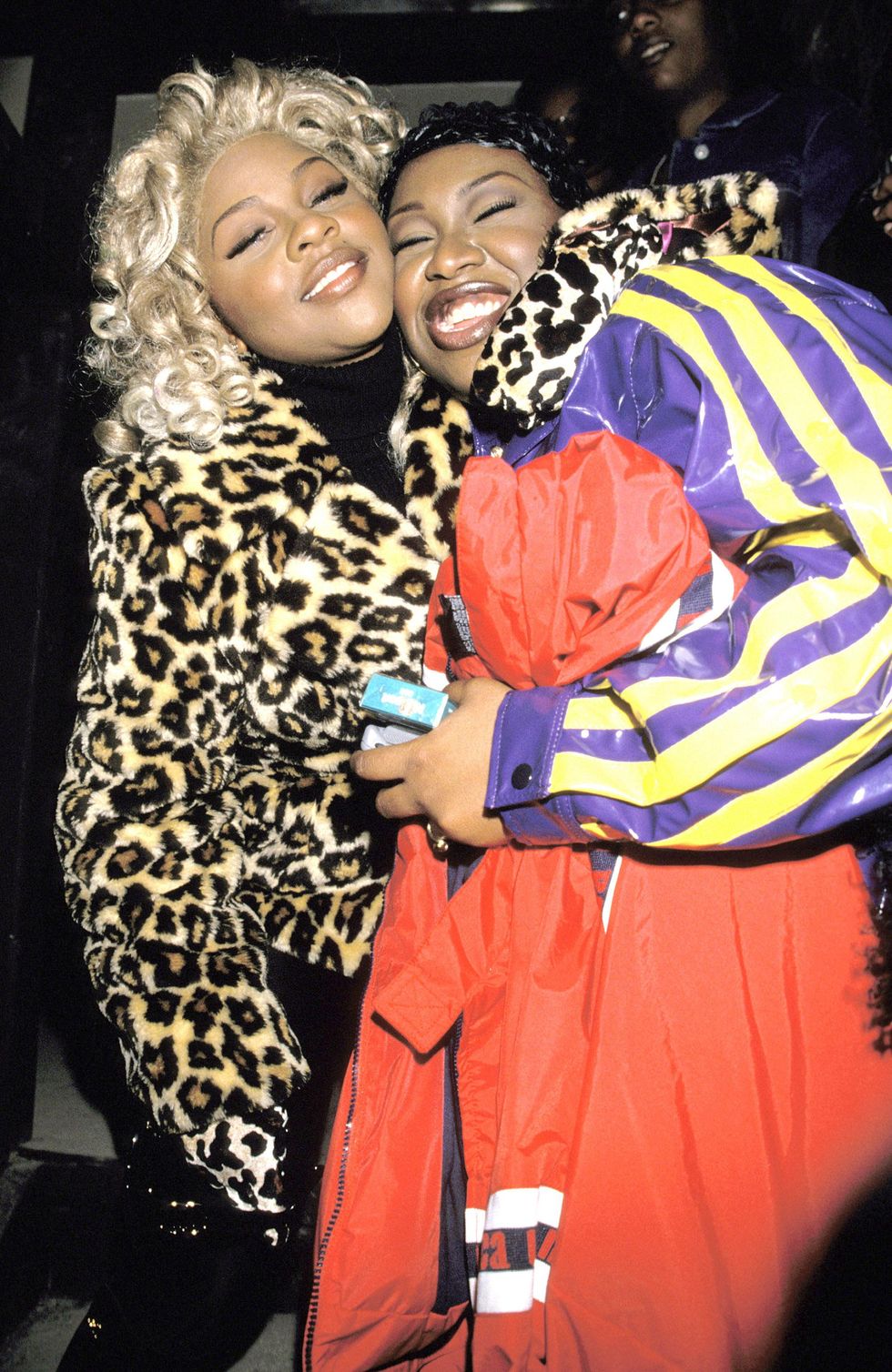
KMazur/WireImage via Getty Images
This changed the game entirely for women emcees and has made it a lot harder for radical women rappers to have a chance at success in mainstream hip-hop because most music today is being based on sexualization and very little content that speaks to the reality of the everyday woman.
Feminist writer Ariel Levy affirmed this further by saying that such a culture isn't progressive when women are capable of acting as participants of their own objectification. So we can't just blame men for objectifying us when now we are taking part in the same perspective to convince society that Black women rappers are enough and are as valuable to their male counterparts and that we'll agree to produce what sells most, delivering a homogeneous perspective of female dominance in today's hip-hop climate.
We have to be held as accountable as our male counterparts if we want to see sustaining change.
Communications studies professor-Jared Ball of Morgan State University wrote, "Today's contemporary hip-hop from women paves a space for these women, instead, to become the representative, as they have been increasingly able to compete and succeed with the men in the same genre. Regardless of artistic intent and the artist's desire to claim agency of their own bodies, these still may not exempt them from objectification."
So though Black women rappers are finally taking up more of the spotlight, their integrity is being challenged based on how they'd like to present themselves. Do all women in the game want to show more skin, or is it encouraged by people behind the lens of those scenarios?
 twerk good form GIF by Nicki MinajGiphy
twerk good form GIF by Nicki MinajGiphyTo paint a picture of how powerful hypersexuality is in the industry, let's think of some of the most popular Black women rappers, Nicki Minaj, Cardi B, and Megan Thee Stallion. Though Minaj may be a bit more well-versed in the content she raps about, her biggest hits stem from the hypersexual lens. Lyrics like these featured in her song "Boss Ass Bitch":
P-p-p-pussy like girls
Damn, is my pussy gay?
It's a holiday, Play-With-My-Pussy Day
Pussy this, pussy that, pussy taken
Pussy ride dick like she a Jamaican
Pussy stay warm, pussy on vacation
You loose bitches need a pussy renovation
Y-y-you could eat it with a pussy reservation
P-p-pussy 'bout to get a standin' ovation
Clap, clap, clap for this pussy, nigga
The line, "But I can't give this pussy to a pussy nigga" depicts the imagery of manipulation and power plays gained through sex.
Most of Megan Thee Stallion's Billboard hits are all hypersexualized, from "Body," "Cry Baby," "Thot Shit," and "Savage," to "Hot Girl Summer."
In Stallion's song "Cry Baby," she raps:
Lay on my stomach, toot it up, do the crybaby (crybaby)
Look back, hold it open, now he annihilated (yeah)
Moaning like a bitch when he hit this pussy
Damn, he probably wanna wear my hoodie (ah)
Choke me, spank me, look at me, thank me (thank me)
If I give it to another nigga, he'll hate me (he'll hate me)
Spit, slurp, give him that work
Fell too fast for me, now the nigga hurt."
 Cardi B Booty GIF by Megan Thee StallionGiphy
Cardi B Booty GIF by Megan Thee StallionGiphyAnd as a result of parading the excess liberal feminism, she was recently awarded three Grammys in 2021 for "Best New Artist," "Best Rap Song," and "Best Rap Performance"—so in more ways than one society is fully here for hypersexuality being the center of the conversation.
And Cardi B's Billboard hits like "Up," "WAP," "Wildside" have been in high demand based on the several weeks they stayed glued to the top 10 spots on the Billboard charts. So at this point, their success sets the mark for what's in demand from Black women artists compared to vice versa. Cardi B and Megan Thee Stallion's "WAP" came in at No. 2 on the staff's pick of the best rap songs for 2020, and it spent four weeks as the No.1 spot on the Billboard charts.
Then you have our good sis Nicki Minaj's "Anaconda," which spent 26 weeks at No.1 on the Billboard charts and perpetuates the image that appeals to mass audiences. Because of its success, this type of music will continue to be produced.
In that sense, liberal feminism supersedes the industry beliefs of radical feminism and its ability to sell. Sex sells, and songs about the collective do not.
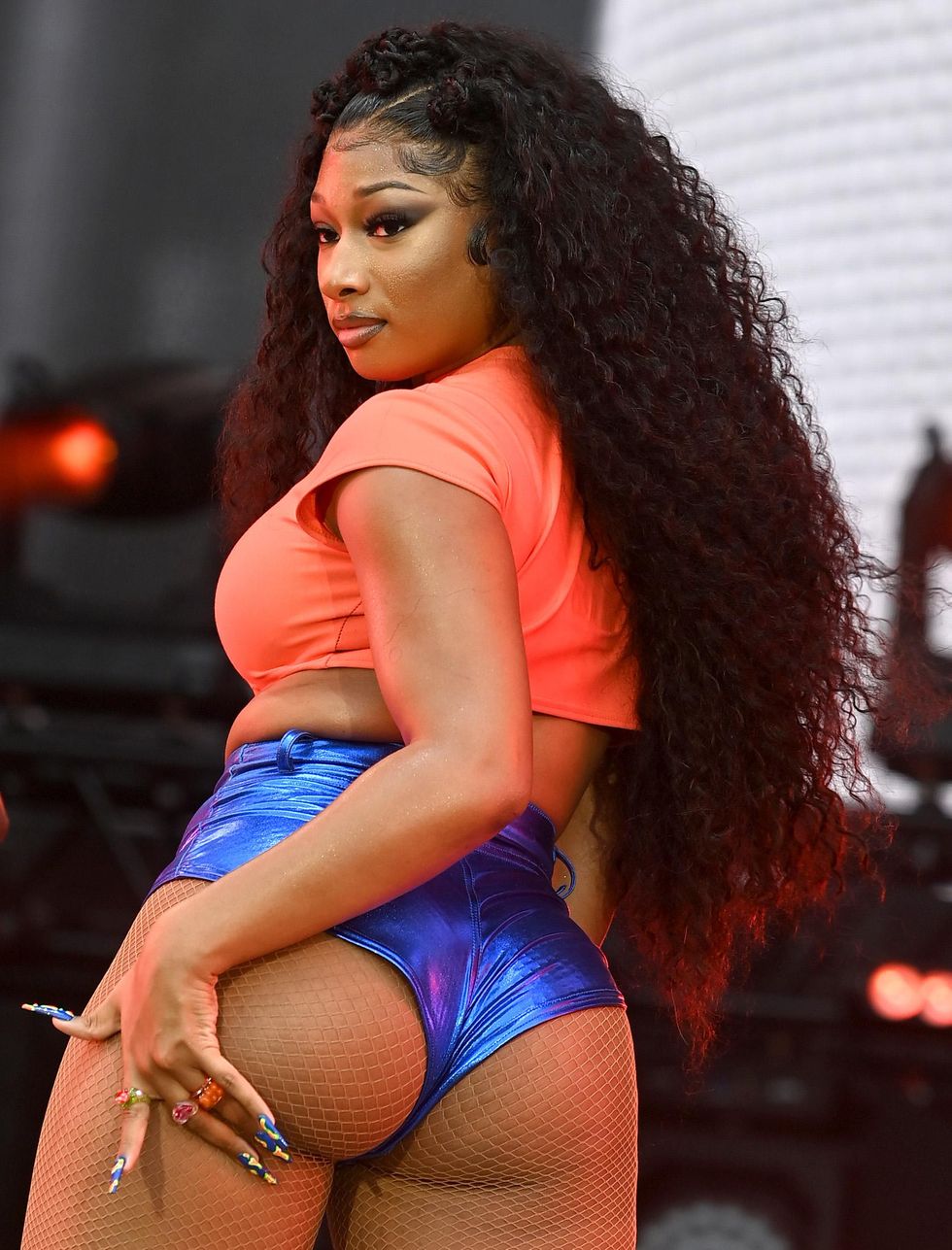
Paras Griffin/Getty Images
The one-and-only Lauryn Hill's "Doo Wop (That Thing)," produced in 1998, was No. 1 on the Billboard charts for 22 weeks? The insanely talented and lyricist Missy Elliott still doesn't have a Billboard No.1 hit to this day, which is disheartening because of the impact she has had on hip-hop music, coming through with unmatched energy and bars as charismatic as any man or woman before or after her—yet it is not as valued collectively by music executives and society.
Where does the hip-hop industry allow women like Rapsody, Tierra Whack, Noname, Chika, and Little Simz the same opportunity to shine like most mainstream women artists that often project the homogeneous lens to thrive and compete in this highly ego-driven industry?
 Pretty Ugly GIF by Tierra WhackGiphy
Pretty Ugly GIF by Tierra WhackGiphyIn many ways, we can't fully blame liberal women artists because they are trying to compete in a market that was never built for them, but the question is at what cost? Hip-hop scholars mentioned, "Many women have turned to claim or embrace their sexualities under the guise of true empowerment because they feel valued as a sexual object... But this liberal sexual empowerment, claiming the right to assert the individual agency to sexualize oneself, is only an illusion because the power given still comes from men and the male gaze."
And the biggest question of them all is why are most mainstream Black women artists light skin, bi-racial, or racially ambiguous, and the majority of the underground women rappers are dark skin women?
It's far from ironic that this is very much on script with the extensive history of colorism that affects Black women more than Black men in the music industry.
Colorism, Pretty Privilege And Body Positivity In Hip-Hop
Colorism to many ears may come off like a tiresome topic, but it's a very much-needed conversation in regards to dark skin Black women being misrepresented in the industry. And often, feelings of inadequacy crafted by colorist themes materialize in Black female rappers as well. Years ago, Lil' Kim spoke about her deep-rooted insecurities based on her complexion and body, leading to her extensive obsession with tons of cosmetic surgeries and skin bleaching.
Kim stated, "I have low self-esteem, and I always have. Guys always cheated on me with women who were European-looking. You know, the long-hair type, really beautiful women that left me thinking, 'How can I compete with that?' Being a regular black girl wasn't good enough."
Lil' Kim's struggle with being a "regular Black girl," and the apparent rejection of her Blackness by Black men even before entering the rap industry shows that America's European standards of beauty produce a proclivity for light skin by men and a lack of self-confidence in Black women, as seen in Lil' Kim.
 lil kim GIF by VH1 Hip Hop HonorsGiphy
lil kim GIF by VH1 Hip Hop HonorsGiphyWith these European standards of beauty palpable in every part of the media and pop culture, its presence in rap is not nonplus. However, rap could change this narrative of "light is right." That toxic mindset and pretty privilege often co-exist in the hip-hop industry, allowing many individuals instant success if they fit a certain aesthetic. An interesting exception was when Saweetie went viral after she dropped her single "Icy Girl" and Hot 97's Ebro Darden didn't perpetuate the same narrative during an interview in February 2018. He described her freestyle as "basic" and mentioned she needed to work harder to "impress" him.
Regardless of his commentary, the bar is very low for certain female rappers to have easy access to success over their peers based on complexion. The industry is not as much fixated on thought-provoking lyrics and their impact. When you add the layers of additional intersectional walks of sexuality, particularly darker shades of women, and fatphobia–there is an inevitable amount of trauma and rejection to work through.
 2018 GIF by BET Hip Hop AwardsGiphy
2018 GIF by BET Hip Hop AwardsGiphyGrammy-nominated artist Chika told The Root, "I am not the spokesperson for body positivity. I'm not the spokesperson for being dark-skinned. I'm not the spokesperson for having a nappy-ass dread head. I am none of those things. Stop asking me questions that you should figure out for yourself."
The reality is Black men aren't pressed because they are dark-skinned or wear their fades or cornrows, but Black women are often trolled for their Blackness, and the guidelines are incredibly rigid and overwhelming to maneuver through. It's like just being Black and a woman is a more significant problem.
When white women wear the same hairstyles and get the additional surgeries enhancements, it's edgy and glorified, but let a Black woman be herself, and it's a problem. In Lizzo and Cardi B's song "Rumors" the duo challenges stereotypes of their personal trauma of not ever feeling like they amount too much, Lizzo is tenaciously working through fatphobia commentary.
And Cardi B recently addressed rumors about her BBL and other surgeries to enhance her assets. The reality is, there have been underlying, deep-rooted issues in hip-hop that normalize the practice of artists suppressing their pain and insecurities.
This needs to be dismantled so Black women artists can have the space to not always feel like they need to take life-threatening measures for validation or to compete.
The Future For Black Women In Hip-Hop
 Saweetie Dojacat GIF by Trés SheGiphy
Saweetie Dojacat GIF by Trés SheGiphyThe moral of the story: We need the balance of both worlds—radical and liberal feminism. There is room for both conversations to be had; everything does not revolve around sex, we can also make space to address the other hundreds of topics that we face as women. The market is currently too fixated on one area over another. And it continually takes away many opportunities from radical artists and leaves women questioning their integrity regarding showing more skin than they're comfortable with to be competitive in this market.
Some of the things women mainstream rappers can do to help shed light on rappers opposite of them is to seek them out and propose a collaboration. Whether it be a single, being an opener at their show, or just promoting their work to change the narrative of there being only one main type of women rapper in today's hip-hop.
The world may have found ways to commodify the sound, but there is power in unity and sculpting a new art form of hip-hop music.
Featured Image via Giphy
- Saweetie Quavo Success - xoNecole: Women's Interest, Love ... ›
- The 'Fits You Missed From The 2021 BET Hip Hop Awards Red ... ›
- This Hip-Hop Medium Became A Self-Made Millionaire By Walking ... ›
- Meet The Hip-Hop Herbalist That's Merging Trap Music & Holistic ... ›
Your December 2025 Monthly Horoscopes Are All About Surrender & Alignment
December is about letting go. We end the year with the need for more peace, reflection, and rejuvenation, and that is exactly what December is providing for us. The Sun is in Sagittarius, and anything is possible. This is the month to believe in that and to know that the universe is supporting you. With a Supermoon in Gemini as we begin the month as well, we have an opportunity to gain the closure we have been looking for this year and to wrap up old projects, ideas, and communication breakthroughs.
This is the month to make your peace the priority and let go of trying to control the way the tides are turning. Trust in your new beginning, and give yourself time to prepare for it this month.
A big part of the clarity that is coming through this month is due to Neptune going direct in Pisces on December 10, after being retrograde here since July. With Neptune now direct, we are able to see our inspiration and creativity a little more clearly, providing the perfect energy for dreams and manifestation to be built upon. The smoke is clearing, and it’s up to you to decide what you want to do with this newfound clarity that this transit is bringing. Mercury also moves back into Sagittarius on December 11, which is great for communication and clarity, and the adventures you were trying to see through at the beginning of November come around for you again with greater purpose and support.
On December 15, Mars enters Capricorn until the end of January 2026, and this is the extra push we need to make important changes and to be on the path towards greater abundance, stability, and prosperity. Mars in Capricorn takes care of business, and we have extra energy at our disposal during this time to do so. This transit is an ideal time to focus on your career or financial goals for next year and to start putting some of these plans into motion now. A few days later, we have the New Moon of the month, which will be in Sagittarius on December 19, and this is the perfect New Moon to manifest.
The energy is high, magic is in the air, and it’s all about moving forward with the new beginnings that are inspiring you and bringing you joy to think about right now.
Capricorn Season officially begins on December 21, and this earth sign energy is how we heal, gain closure, and build new foundations in our world. With Venus also moving into a Capricorn a few days later, there is something about peace, prosperity, and security that we are gaining in life and in love as we close out the year, and this is what we need right now. This month is about reflecting on what was, letting go of old hurt, and renewing. December is an ending and a new beginning in one, and there is magic in this space to be created.
Read for your sun and rising sign below to see what December 2025 has in store for you.
 AriesKyra Jay for xoNecole
AriesKyra Jay for xoNecoleARIES
December is a full-circle moment for you, Aries. You are seeing the gifts in your world and have a lot of gratitude for the way things have come about for you as of late. There are culminations in your world that are providing you with more abundance, stability, and community, and you are exactly where you are meant to be this month. With the Sun in a fellow fire sign and in your 9th house of travel for most of the month, December is a good time to get out of your comfort zone, explore the world around you, and get your body moving.
Mars, your ruling planet, also makes a change and moves into Capricorn on December 15, which will fuel your inspiration and power in your career space. You are making a lot of professional progress as we close out the year; however, make sure to be more mindful of your competitive drive right now. The New Moon on December 19 is the perfect opportunity for you to create some new plans and goals when it comes to traveling, education, and where you want to gain some new inspiration in your world. Overall, this is a month of things coming together for you serendipitously.
 TaurusKyra Jay for xoNecole
TaurusKyra Jay for xoNecoleTAURUS
December is about trusting your intuition, Taurus. You have a lot on your mind this month, and it’s best to delegate, communicate, and allow yourself some relief by opening up to someone and not feeling like you have to hold everything in. As we begin the month, we have a Supermoon in Gemini happening in your house of income, and the plans and projects you have been building here come to fruition for you now. This is the time to gain clarity on your financial world and to take a look at what spending habits you want to let go of here as well.
With Venus in your 8th house of shared resources for most of the month, you are doing a cleanse on your commitments, partnerships, and business ventures. You are taking a look at what you want to dedicate yourself to in the future, and what commitments you may need to let go of now in order to be in the space you truly want to be, both financially and within some of your relationship dynamics. Before we end the month, we have a New Moon in this same area of your chart, and it’s time to look at the opportunities that are presenting themselves and to trust your internal guidance system to lead you forward.
 GeminiKyra Jay for xoNecole
GeminiKyra Jay for xoNecoleGEMINI
You are moving forward fearlessly this month, Gemini. December is your month of love, passion, and dignity, and you are owning the light that you shine. We begin the month with the last Supermoon of the year, happening in your sign, and you are stepping up to the plate. You are showing up, owning how much you have grown this year, and allowing yourself to heal while also acknowledging that you have done your best and you deserve to have fun in the midst of the changes you are creating.
Mercury, your ruling planet, is officially out of retrograde, and you can use this energy to the fullest potential now. With Mercury in your 7th house of love, it’s time to speak from the heart and to talk about the things that matter and that are inspiring you right now to your loved ones. You never know what kind of epiphanies you may have when you open up the conversation to others. Before the month ends, you have a New Moon in this same love area of your chart, and this New Moon is all about manifesting romance, commitment, and abundance in your world.
 CancerKyra Jay for xoNecole
CancerKyra Jay for xoNecoleCANCER
December is an opening for more love, more joy, and more freedom in your life, Cancer. You have come to a place where you hold so much gratitude in your heart for where you are today and where your heart is shining, and things come together for you with more ease right now. With the Sun in your 6th house of health, work, and daily routines for most of the month, you are getting your ducks in a row while also putting more energy and effort into taking care of yourself, your priorities, and your well-being. This month surprises you in many ways, and it’s because you are showing up.
Mars and Venus both move into your house of love, relationships, marriage, and abundance this month, and you are making strides in your love life. You have both of these opposing forces on your side and are being recognized for the love you are while also receiving the love you want. This month, overall, is about focusing more on the positives in your world and letting your heart have its joy. Before December comes to an end, there is a New Moon in Sagittarius, and this is the perfect opportunity to create the plans you want to see through next year, especially when it comes to your work life, colleagues, business ventures, and health.
 LeoKyra Jay for xoNecole
LeoKyra Jay for xoNecoleLEO
The scales of karma are balancing, and they are balancing in your favor this month, Leo. December is your month of truth, and of seeing it clearly in your world. The Sun is in your house of romance, pleasure, and happiness for most of the month, and it’s time to relax, be in the present moment, and allow what is meant to be, to be. With a Supermoon in your 11th house of manifestation as December begins, this is a powerful month for seeing your dreams come to fruition, and for feeling like the intentions you have set this year are finally here for you now.
Mars also moves into your 6th house mid-month, and this is the perfect energy to have to move into the new year. You have extra energy at your disposal right now and are feeling fearless with what is possible for you and your daily routine. Before the month ends, we also have a New Moon in a fellow fire sign, Sagittarius, and this is a breakthrough moment for you and your heart. December, overall, wants to show you how loved and supported you are and will be doing so in magical, unexpected, and concrete ways.
 VirgoKyra Jay for xoNecole
VirgoKyra Jay for xoNecoleVIRGO
December is a month of victory, Virgo. You are showing up and experiencing some new successes in your world that move you forward on your path in life. With a Supermoon in your 10th house of career as we begin the month, the effort and intentions you have made this year come into full bloom, and you are being recognized for who you are and the good work you have done. This month is all about showing up and allowing yourself to be seen and loved, knowing that you deserve the support and opportunities you are receiving.
Mars moves into Capricorn on December 15, which brings the passion and excitement into your love life, hobbies, and little pleasures in life that light you up. You want to have fun this month and are going to be walking into the new year with this fearless, happy, and spontaneous energy within you. Before the month ends, Venus also enters Capricorn, and in this same area of your chart, you have a lot to look forward to and believe in right now. Overall, December wants you to be happy and will be doing everything possible to make that happen for you. This is your month to shine, Virgo.
 LibraKyra Jay for xoNecole
LibraKyra Jay for xoNecoleLIBRA
December is a month of opportunity for you, Libra. New doors open, and you are financially making breakthroughs this month because of it. December begins with a Supermoon in your 9th house, and you are getting a clearer view of where you have been making strides in your life and how it has all brought you here to this present moment of freedom. This month is showing you what happens when you are fearless with your purpose and when you believe in yourself and what you are worthy of.
Moving further into December, Mars moves into your 4th house of home and family mid-month, and you are closing out the year in your safe spaces. You are spending more time with your loved ones and taking the time to quiet your mind and listen to what your heart has been telling you. Before the month ends, we have a New Moon in Sagittarius, happening in an area of your life that deals with communication. This is a great time for getting the answers you have been looking for and for feeling more clear-headed and confident about the decisions you are making as you move into the new year.
 ScorpioKyra Jay for xoNecole
ScorpioKyra Jay for xoNecoleSCORPIO
Patience is a virtue this month, Scorpio. December is all about remaining patient and vigilant with what you are creating in your world, and knowing that the universe has your back. It’s time to be reminded of the power of hope, and this month is an opening to greater clarity in your life. There is a lot of energy in your financial zones right now, and this is providing you with new opportunities and new insight; however, the speed at which things come about for you may feel daunting. Keep your head up and eyes focused on what you want and know that you are more than worthy of receiving it.
With Mercury in your 2nd house of income this month, December is a good time to plant new seeds and to think about where you want to be financially a month from now or even a year. This month is asking you to think bigger and to think more long-term so that you can set the appropriate plans into motion now. We also have a New Moon in your house of income before the month ends, and this is when you will see more of your dreams come to fruition in this area of your life, and have more opportunities to build. Overall, December will be teaching you a lot, Scorpio.
 SagittariusKyra Jay for xoNecole
SagittariusKyra Jay for xoNecoleSAGITTARIUS
Sagittarius Season is here, and there is a lot in store for you this month, Sag. December is all about what you are dedicating yourself to. It’s about setting your intentions and putting the work in to back up your dreams, and about getting things in order so that when the new beginnings come, you are ready for them. The Sun and Venus are in your sign for most of this month, and there are a lot of eyes on you right now. You have the potential to create a new beginning for yourself, and it’s time to invest in yourself, your love life, and your dreams.
Mercury moves into Sagittarius on December 11, and this is giving you another opportunity to see through some of the plans that you had initiated in November. Mercury was retrograde in your sign last month, and there may have been some disruptions to your vision and plans for the future, and now this energy is turning around for you. Before the month ends, we also have a New Moon in Sagittarius, and you are walking through new doors fearlessly. You are catching others by surprise by your growth this month, and you are thinking a lot about your purpose, future, and plans for the new year.
 CapricornKyra Jay for xoNecole
CapricornKyra Jay for xoNecoleCAPRICORN
December is all about the vision, Capricorn. You are moving through a lot of changes and transformations this month, yet they are giving you a chance at a new beginning in the process. You are focused more on the future and what goals you want to manifest for yourself right now, and are ready to let go of what hasn’t been working for you. With the Sun in your 12th house of closure for most of December, this is your time for healing, but remember, healing doesn’t have to be isolating or boring; you can thrive while you renew, and you are this month.
Mid-month, the excitement picks up for you, and you are feeling more energized than you have in a while. Mars moves into Capricorn until the end of January 2026, and you are being proactive with your goals, intentions, and passions. You are a force to be reckoned with this month, and you are making things happen for yourself with confidence. Capricorn Season officially begins on December 21 this year, and this is definitely speeding up your healing process. You are breaking free from what was, and with Venus also moving into Capricorn before the month ends, you are leaving this year in high spirits and with love opening a new door for you.
 AquariusKyra Jay for xoNecole
AquariusKyra Jay for xoNecoleAQUARIUS
December is all about community, creativity, and manifestation, Aquarius. This is the month to work together with others to help bring your dreams to life. You are in a space of inspiration, empowerment, and beauty, and are creating more of this energy around you and in your world. Look out for what support comes your way this month and know that you don’t have to do everything alone to succeed. With the Sun in your 11th house of manifestation and friendship, your intentions are coming to fruition, and it’s time to celebrate with the people you love and to own how far you have come this year.
On December 19, we have a New Moon in Sagittarius, lighting up your life in all of the best ways possible. This is your New Moon of freedom, victory, and magic, and you are seeing new beginnings appear that you were once just hoping for. Before the month comes to an end, Venus moves into your 12th house of closure, and after an active and successful month, you are ready to relax, heal, and give your heart some of the attention it has been asking for. You are moving into the new year with the need to release and renew what hasn’t been working in your relationships, and you are finally ready to.
 PiscesKyra Jay for xoNecole
PiscesKyra Jay for xoNecolePISCES
December is a big month for you, Pisces. You are making some huge accomplishments this month, and are feeling like everything you have been through this year has been worth it for these moments that are coming to fruition for you now. The Sun is in your 10th house of career and reputation for most of the month, and this is where a lot of your focus is right now. You are claiming your successes and putting yourself out there in ways that not only serve you, but that inspire others as well.
Neptune officially goes direct on December 10, after being retrograde in your sign since July, and you are finally seeing things a little more clearly. You are feeling renewed inspiration and passion in your life, and your intuition is your strongest asset right now. Before December comes to an end, we also have a New Moon in your 10th house of career, and what happens now not only changes things for you in the present, but it also opens new doors and what is possible for you in the new year as well. Overall, you are on top of your game this month and are owning the joy and empowerment you feel.
Featured image by Kyra Jay for xoNecole
I wish I enjoyed drinking plain ole’ water. I don’t, though, and, at this point, I doubt that I ever will. It’s not something that I’m proud of or anything, but like I’ve said in other articles on this platform, to me, water is so damn boring; it’s literally like drinking “wet air.”
That doesn’t mean I don’t accept that it’s a “necessary evil” being that we all are made up of so much water and being dehydrated (which is something that a lot of us are) can cause so many health-related issues, including blurred vision, muscle cramps, dried skin, fatigue and even moodiness.
That’s why, over the years, I’ve been intentional about figuring out ways to get more agua into my body without feeling like it’s a chore or something to dread. And now, I want to pass some of those hacks on to you, just in case you happen to totally relate to where I am coming from.
If something that you want to do more of right through here is get extra H2O into your system, here are 10 tips that can absolutely help to make that possible.
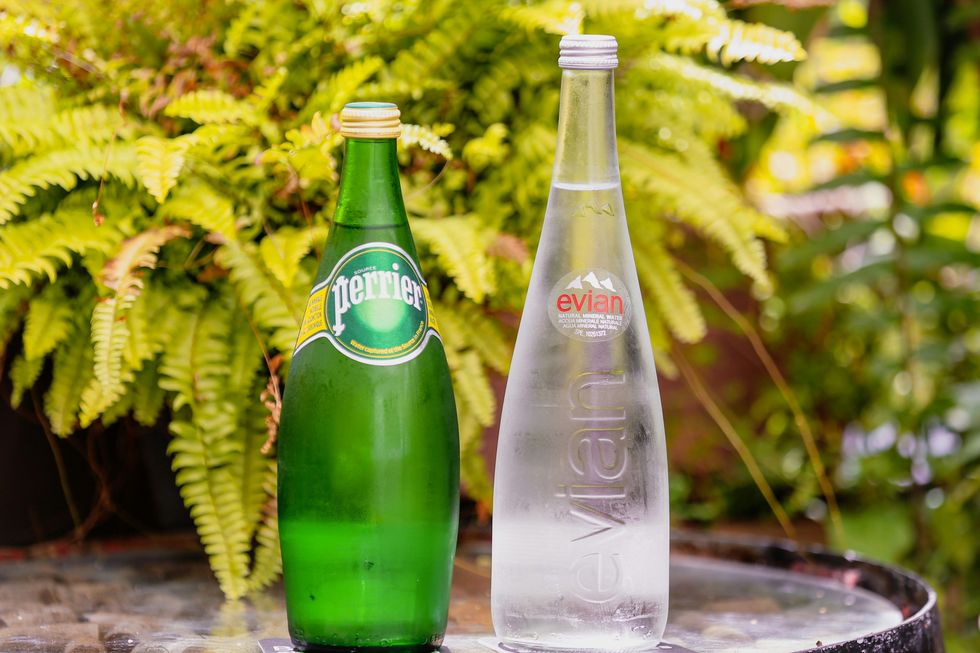
Unsplash
1. Invest in a Fun Water Bottle
There’s a far greater chance that you are going to drink water if you have a water bottle around you. So, cop yourself a cute one — one that will help you to stay motivated. A tumbler that I purchased some time back, just because I thought it was cute as hell, simply says, “Make Better Coochie Decisions” (amen?-LOL). Honestly, that doesn’t just have to apply to sex but how you treat your vagina overall — and that includes making sure that “she” has all of the fluids that she needs.
2. Try Some Sparkling Water or Mineral Water
At this point, I should take stock in Waterloo. It currently is my favorite kind of sparkling water and it has definitely made getting more water into my system easier to do. That’s because I will add some limes to it or a bit of fruit juice to it and that makes drinking water less “meh” for me. Another type of water that has bubbles in it is sparkling mineral water; it can also be beneficial since it contains magnesium, potassium and calcium.
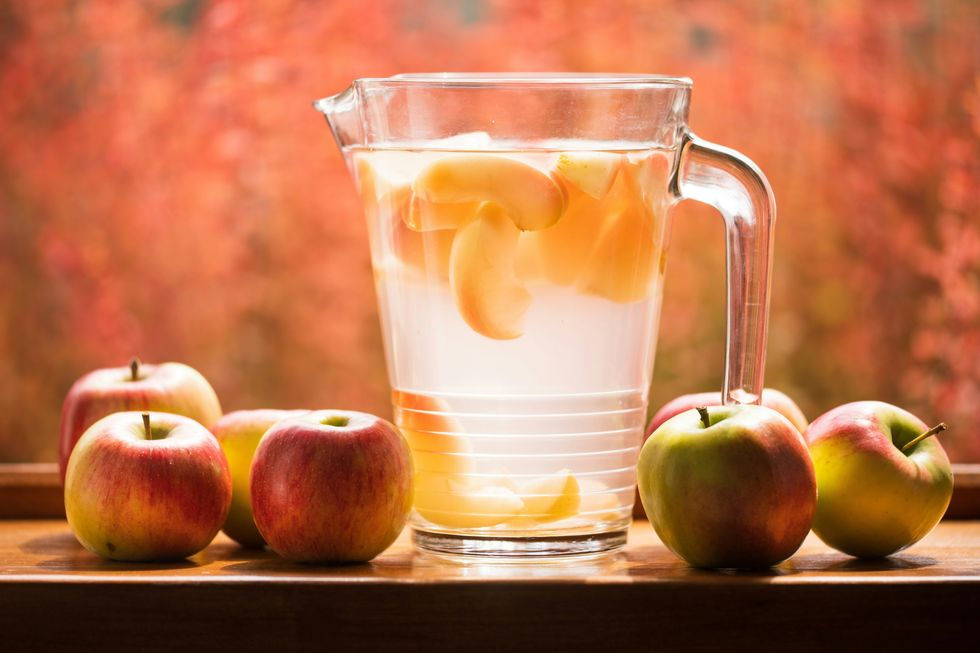
Unsplash
3. Go Halfsies with Your Other Drinks of Choice
Speaking of making some all-natural soda (which is basically what happens when you add juice to sparkling water or sparkling mineral water), you can find yourself drinking more water while consuming less calories if you fill up your glass with half of your favorite fruit juice and half of some sparkling water. More times than not, the juice doesn’t even taste watered down. Try it before you doubt me.
4. Collect Some Infused Water Recipes
I’m forever gonna be a fan of infused water; that’s because it’s water that has fresh fruits and/or veggies in them — and it doesn’t get any healthier than that. Plus, infused water tends to take on the taste of whatever fruits or vegetables that you put into the water (if you let the stuff soak for a couple of hours), so that the water doesn’t taste so boring and bland. Wanna try a few recipes? You can check out some here and here.
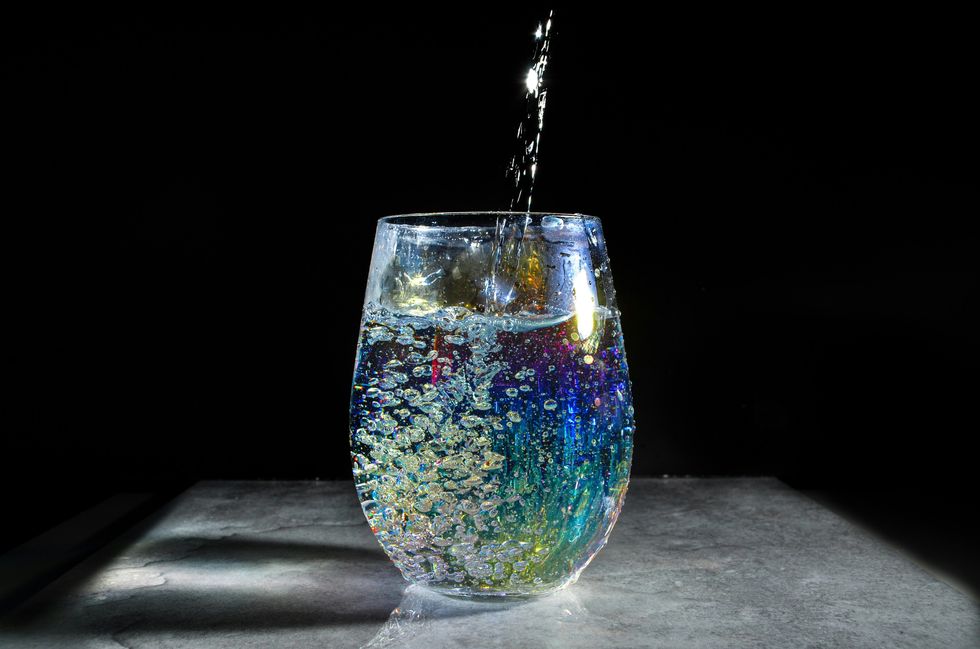
Unsplash
5. Make Slushies Instead of Smoothies
Are you someone who enjoys consuming smoothies? Well, if you want to get more water into your system, how about going with a slushie instead? Although it is true that some smoothies have water as a base, the most bomb ones use milk (or a milk alternative) or yogurt. Slushies, on the other hand, typically go with crushed ice (which is frozen water) instead. That said, some (pardon the pun) cool slushy recipes can be found here, here and here.
6. Use Water As Your “Drink Chaser”
Another great thing about water is it can help to keep you from overeating; it does that by causing you to feel full if you drink it while you are eating. And speaking of calorie-counting, if you don’t want to give up your favorite drink at mealtime, one way to keep from downing 2-3 glasses of it at a time is to use water as your “chaser.” What I mean by that is, after enjoying a glass of your favorite beverage, “chase it down” with a glass of water. That should satisfy your want for what you want without overdoing it.
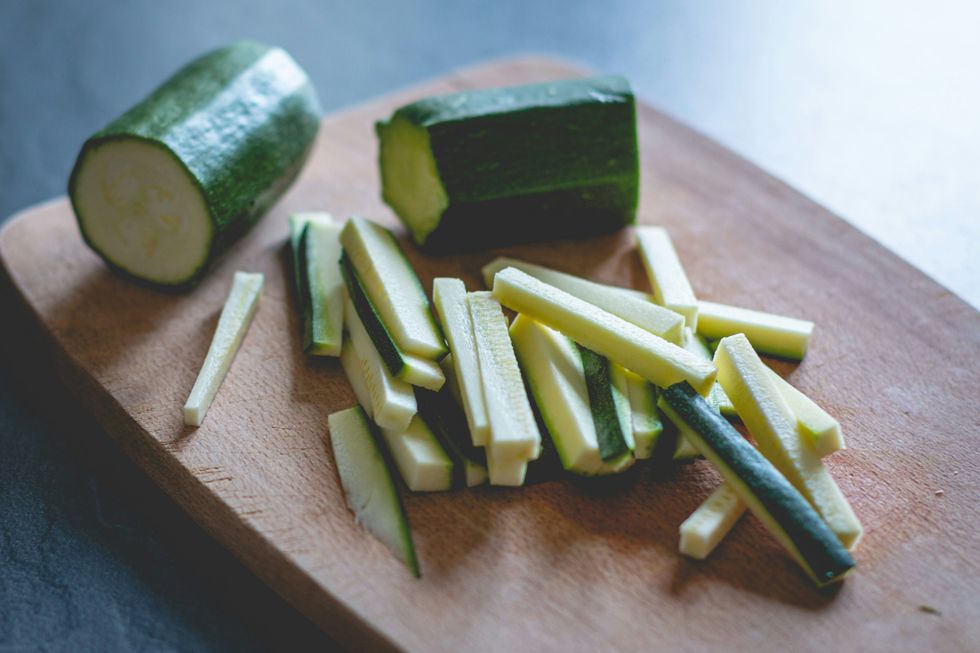
Unsplash
7. Eat Foods That Are High in Water Content
Another way to get more water into your body is to eat foods that have a ton of water in them. Some that top the list include lettuce (96 percent); cucumber (95 percent); zucchini (95 percent); celery (95 percent); strawberries (91 percent); cantaloupe (90 percent), and peaches (89 percent).
8. Have a Ball with Your Ice Cubes
Ice cubes are frozen water, right? That’s why most of us prefer to enjoy our drinks before the ice cubes melt because melted cubes water down whatever it is that we are consuming. And so, for this very reason, add more ice cubes to your drinks — and have fun making them. You can add juice, fruit and/or mint leaves while making your cubes. That way, they are aesthetically-pleasing; plus, they will also add more flavor to your water once the ice cubes actually melt.
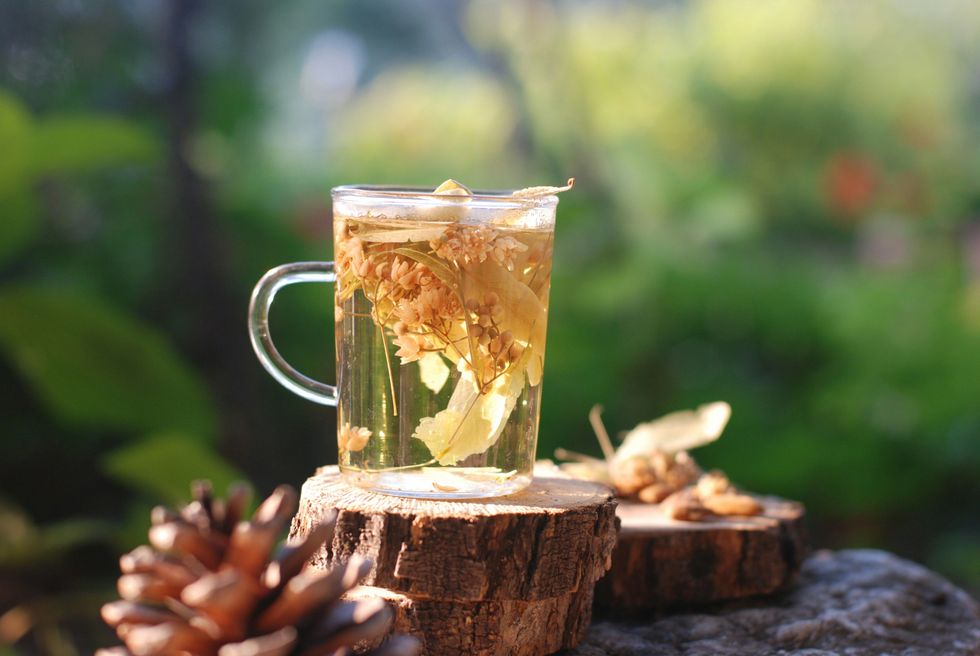
Unsplash
9. Add Some Non-Alcohol Cordial to Your Water
If you’re fine with just having a tad of taste in your water, why not add a bit of cordial to it? Cordial is simply a type of tonic, syrup or sweetener (that can contain alcohol or not) that can help to make your water more…interesting. Some alcohol-based cordials can be found here. Some non-alcoholic recipes are located here.
10. Technically, Herbal Tea Counts
Tea is always gonna be my thing. That’s why I’ve penned articles on it for the site like “10 Different Ways Herbal Teas Can Fit Into Your Beauty Regimen”, “10 'Uncommon' Teas You Should Add To Your Stash (& Why)” and “I've Got 10 Teas That Will Help You To Age (Even More) Gracefully” And y’all, if you want to get a lot more water into your system yet a tall glass of water only isn’t your — pardon the pun — cup of tea, make some iced herbal tea instead.
It’s basically water with some herbs tossed in and, if you add some honey or raw organic coconut palm sugar to it, it will be a really sweet treat that will still be extremely hydrating (and very healthy) for you.
Water that is a bit more exciting for you…now. LOL.
Drink up!
Let’s make things inbox official! Sign up for the xoNecole newsletter for love, wellness, career, and exclusive content delivered straight to your inbox.
Featured image by Unsplash



 Booty GIF by Doja Cat
Booty GIF by Doja Cat



